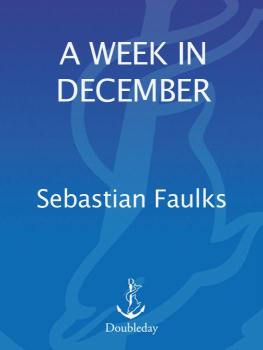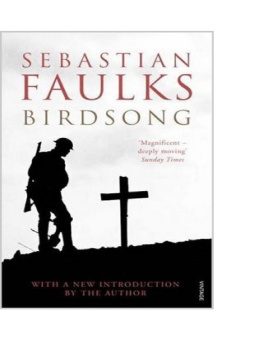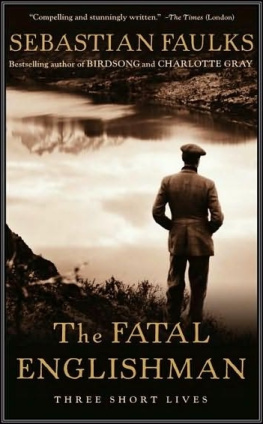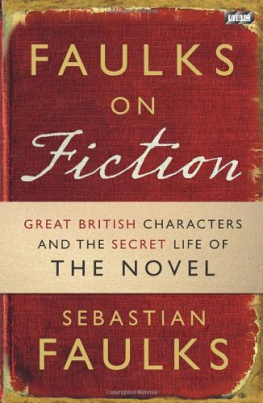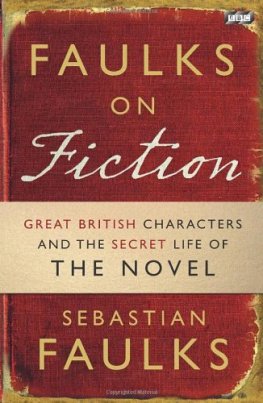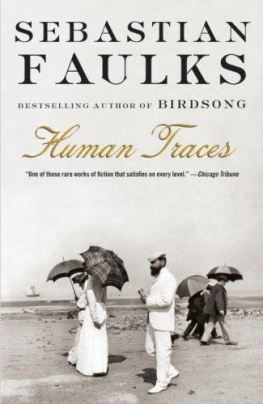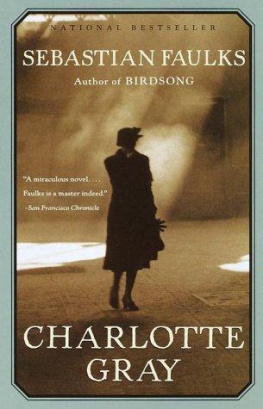Sebastian Faulks - A Week in December
Here you can read online Sebastian Faulks - A Week in December full text of the book (entire story) in english for free. Download pdf and epub, get meaning, cover and reviews about this ebook. year: 2010, publisher: Doubleday, genre: Detective and thriller. Description of the work, (preface) as well as reviews are available. Best literature library LitArk.com created for fans of good reading and offers a wide selection of genres:
Romance novel
Science fiction
Adventure
Detective
Science
History
Home and family
Prose
Art
Politics
Computer
Non-fiction
Religion
Business
Children
Humor
Choose a favorite category and find really read worthwhile books. Enjoy immersion in the world of imagination, feel the emotions of the characters or learn something new for yourself, make an fascinating discovery.
- Book:A Week in December
- Author:
- Publisher:Doubleday
- Genre:
- Year:2010
- Rating:5 / 5
- Favourites:Add to favourites
- Your mark:
- 100
- 1
- 2
- 3
- 4
- 5
A Week in December: summary, description and annotation
We offer to read an annotation, description, summary or preface (depends on what the author of the book "A Week in December" wrote himself). If you haven't found the necessary information about the book — write in the comments, we will try to find it.
A Week in December — read online for free the complete book (whole text) full work
Below is the text of the book, divided by pages. System saving the place of the last page read, allows you to conveniently read the book "A Week in December" online for free, without having to search again every time where you left off. Put a bookmark, and you can go to the page where you finished reading at any time.
Font size:
Interval:
Bookmark:
Also by Sebastian Faulks
The Girl at the Lion dOr
A Fools Alphabet
Birdsong
The Fatal Englishman
Charlotte Gray
On Green Dolphin Street
Human Traces
Pistache
Engleby
Devil May Care (writing as Ian Fleming)

For David Jones-Parry
As long as the music is playing, youve got to get up and dance Were still dancing.
Chuck Prince, chief executive, Citigroup,
Interview, Financial Times, July 9, 2007
If you talk to God, you are praying. If God talks to you, you have schizophrenia.
Dr. Thomas Szasz, psychiatrist,
The Second Sin, 1973
Sunday, December 16
Five oclock and freezing. Piledrivers and jackhammers were blasting into the wasteland by the side of West Cross Route in Shepherds Bush. With a bare ten months to the scheduled opening of Europes largest urban shopping center, the sand-covered site was showing only skeletal girders and joists under red cranes, though a peppermint facade had already been tacked on to the eastward side. This was not a retail park with trees and benches, but a compression of trade in a city center, in which migrant labor was paid by foreign capital to squeeze out layers of profit from any Londoner with credit. At their new Emirates Stadium, meanwhile, named for an Arab airline, Arsenal of North London were kicking off under floodlights against Chelsea from the West, while the goalkeepersone Czech, one Spanishjumped up and down and beat their ribs to keep warm. At nearby Upton Park, the supporters were leaving the ground after a home defeat; and only a few streets away from the Boleyn Ground, with its East End mixture of sentimentality and grievance, a solitary woman paid her respects to a grandfathercome from Lithuania some eighty years agoas she stood by his grave in the overflowing cemetery of the East Ham Synagogue. Up the road in Victoria Park, the last of the dog walkers dragged their mongrels back to flats in Hackney and Bow, gray high-rises marked with satellite dishes, like ears cupped to the outside world in the hope of gossip or escape; while in a minicab that nosed along Dalston Road on its way back to base, the dashboard thermometer touched minus two degrees.
In his small rooms in Chelsea, Gabriel Northwood, a barrister in his middle thirties, was reading the Koran, and shivering. He practiced civil law, when he practiced anything at all; this meant that he was not involved in getting criminals off, but in representing people in a dispute whose outcome would bring financial compensation to the claimants if they won. For a long time, and for reasons he didnt start to understand, Gabriel had received no instructions from solicitorsthe branch of the legal profession he depended on for work. Then a case had landed in his lap. It was to do with a man who had thrown himself under a Tube train, and concerned the extent to which the transport provider might be deemed responsible for failing to provide adequate safety precautions. Almost immediately, a second brief had followed: from a local education authority being sued by the parents of a Muslim girl in Leicester for not allowing her to wear traditional dress to school. With little other preparatory work to do, Gabriel thought he might as well try to understand the faith whose demands he was about to encounter; and any educated person these days, he told himself, really ought to have read the Koran.
Some yards below where Gabriel sat reading was an Underground train; and in the drivers cab a young woman called Jenni Fortune switched off the interior light because she was distracted by her own reflection in the windscreen. She slowed the train with her left hand on the traction brake control and, just before she drew level with the signal, brought it to a halt. She pressed two red buttons to open the doors and fixed her eyes on the wing mirror to watch the passengers behind her getting in and out.
She had been driving on the Circle and Metropolitan lines for three years and still felt excited when she clocked in for her eight-hour shift at the depot. She felt sorry for the poor passengers who sat and swayed behind her. Sideways on, they saw only bags and overcoats, hanging straps and worn plush under strip lights with suffocating heaters locked on max. They endured the jostle and the boredom, with occasional stabs of fear when drunken, swearing youths pushed on.
From her view, Jenni saw soothing darkness, points, a slither of crossing rails and signals that glowed like red coals. She rattled the train through the tunnels at forty miles per hour and sometimes half expected skeletons to loom out from the wall or bats to brush her face. Head-on, she saw the miracles of London engineering that no passenger would ever glimpse: the corbeled brickwork through which the tunnels had been cut or the giant steel joist that held up a five-floor building above the entry to the platform at Liverpool Street.
The week before Christmas was the worst time of year for people throwing themselves on the track. Nobody knew why. Perhaps the approaching festivity brought back memories of family or friends whod died, without whom the turkey and the streamers seemed a gloomy echo of a world that had once been full. Or maybe the advertisements for digital cameras, aftershave and computer games reminded people how much they were in debt, how few of this years must-have presents they could afford. Guilt, thought Jenni: a sense of having failed in the competition for resourcesfor DVDs and body lotionscould drive them to the rails.
Books were what she was hoping to find beneath her own tree. Her favorite authors were Agatha Christie and Edith Wharton, but she read with undifferentiated gleephilosophy or airport novels. Her mother, who had come from County Cork, had barely owned a book and had been suspicious of Jennis reading habits as a teenager. She urged her to get out and find a boyfriend, but Jenni seemed happier in her room with 600-page novels with titles in embossed gold lettering that told how a Russian pogrom had led, two generations later and after much suffering and sex, to the founding of a cosmetics dynasty in New York. Her father, who was from Trinidad, had left home when Jenni was eight months old.
After her shift she would return to the novel that had won the big literary prize, the 2005 Caf Bravo, which she was finding a bit thin. Then, after making something to eat for herself and her half brother Tony, if he was there, she would log on to Parallax, the newest and most advanced of alternative-reality games, where she would continue to create the life of her stand-in, or maquette as the game had it, Miranda Star.
Two years before, when she was still new to the job, Jenni had had a jumper. She was coming into Monument when a sudden flash of white, like a giant seagull fluttering from the platform edge, had made her brake hard. But it was too late to prevent her hitting a twenty-year-old man, whose leap had cleared the so-called suicide pit but not taken him as far as the positive rail on the far side. Dont look at their faces was the drivers wisdom, and after three months counseling and rehabilitation, Jenni had resumed her driving. The man, though seriously injured, had survived. Two months later, his parents brought a civil action against Jennis employers, claiming negligence, because their lack of safety precautions had been responsible for the sons injuries. They lost the case, but had been granted leave to appeal, and the thought of the imminent second hearingtomorrow there would be another meeting with the lawyer, Mr. Northwooddarkened the edges of Jenni Fortunes days.
Next pageFont size:
Interval:
Bookmark:
Similar books «A Week in December»
Look at similar books to A Week in December. We have selected literature similar in name and meaning in the hope of providing readers with more options to find new, interesting, not yet read works.
Discussion, reviews of the book A Week in December and just readers' own opinions. Leave your comments, write what you think about the work, its meaning or the main characters. Specify what exactly you liked and what you didn't like, and why you think so.

